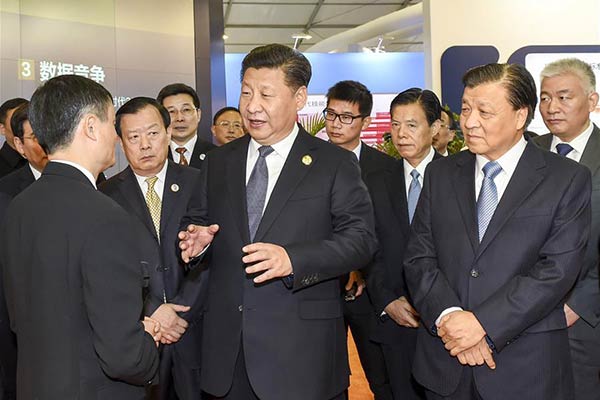 |
|
President Xi Jinping talks with Alibaba Chairman Jack Ma (left) during his trip to the ongoing Internet expo themed "Light of the Internet" in Wuzhen, Zhejiang province, on Dec 16, 2015. The expo displays the latest Internet technologies and products in China and abroad.[Photo/Xinhua] |
Many terrorists take advantage of the Internet to organize terrorist activities, and their major recruitment target is young people, which causes cybersecurity to be an increasingly serious problem worldwide, said Chen Weixiong, deputy executive director of the Counter-Terrorism Committee Executive Directorate of the United Nations Security Council.
"More than 100 countries, including China, have found that nearly 30,000 people participate in terrorism-related activities after being recruited online," Chen said during the Second World Internet Conference in Wuzhen, Zhejiang province.
Noting that the Internet has been the main platform for terrorists to spread extremism, he called on Web service operators and social media providers to focus on anti-terrorism efforts, and not just profits, by monitoring activity and assuming more responsibility for fighting terrorism.
"I'm happy to see that some Internet giants ... have made efforts against terrorism, and I hope more enterprises can be members of the anti-terrorism team," he said.
Additionally, it is urgent to come up with ways to help young people use the Internet properly, he said. "For example, we can select some celebrities, including basketball or soccer stars, to guide the youth, letting them not be affected" by terrorists' online activities, he added.
In recent years, the number and type of cybercrimes, including fraud, theft, hacking and gambling, have increased in China. In response to this increase, China public security authorities have taken tough measures to crack down on such crimes.
According to the Ministry of Public Security, 1.73 million cases of illegal online activity have been dealt with since the beginning of the year. Almost 300,000 people suspected of involvement in violating laws have been detained.
China is a major target of hackers, and the ministry has vowed that China will continue to crack down on illegal online activities such as hacking attacks.
Liu Xinyun, an official at the ministry's Cybersecurity and Protection Bureau, said the bureau handled 947 cases of hacking attacks and detained more than 2,700 suspects this year.
To improve the situation, Liu said the bureau set up a 24-hour reporting system to enable people to report online crimes and ask for help.
"We have set up a department to deal with online crimes and opened more than 200 labs for getting and analyzing digital evidence," Liu said, adding that the bureau has also trained its staff to make sure that they are better able to crack down on online crimes.
President Xi's five proposals
President Xi Jinping made five proposals at the opening ceremony of the Second World Internet Conference. They are:
1. Quicken the construction of global network infrastructure to advance interconnectivity. By 2020, China's broadband network will cover almost all villages. China is willing to work with all parties concerned to invest more funds and strengthen technical support to jointly promote such infrastructure construction.
2. Build up online platforms for cultural exchange and to promote mutual communication. China is willing to work with all countries to give full play to the communication advantage of the Internet platform, to let people around the world learn about China's excellent culture, to let Chinese learn about the excellent cultures of other countries and to promote the prosperity and development of Internet culture.
3. Promote the innovative development of the Internet economy to boost common prosperity. China is willing to strengthen cooperation with all countries on developing cross-border e-commerce and establishing demonstration areas for the information economy, to promote investment and trade around the world.
4. Safeguard Internet security to enhance development in an orderly way. China is willing to work with all countries to strengthen dialogue and exchange, to control disparities effectively, to formulate international rules of cyberspace that could be generally accepted and international anti-terrorism conventions for cyberspace and to improve the judicial assistance mechanism to crack down on crimes online to safeguard the peace and security of cyberspace.
5. Establish an Internet governance system to promote equity and justice. All countries should strengthen communication, improve the dialogue and negotiation mechanism of cyberspace and study and formulate global Internet governance rules to make global Internet governance more fair and reasonable.
